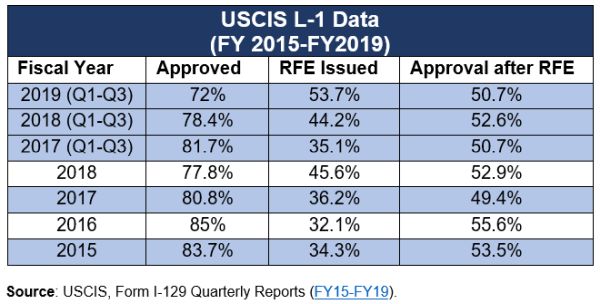At a glance
- In the first three quarters of FY 2019, the rate of requests for evidence and petition denials remain at unprecedented highs for H-1B and L-1 petitions filed at USCIS Service Centers.
- RFE and denial rates for this fiscal year are likely to exceed last year's highs.
A closer look
U.S. Citizenship and Immigration Services data for the first three quarters of fiscal year (FY) 2019 continue to show high rates of requests for evidence (RFE) and denials in several key employer-sponsored nonimmigrant categories. This trend remains consistent with the Trump Administration's directive to tighten employment-based visa eligibility under the Buy American, Hire American Executive Order.
H-1B RFEs and outcomes
H-1B approval rates remain well below where they stood five years ago when cases had a 95.7% chance of approval. In the first three quarters of FY 2019, the overall H-1B approval rate was 83.9%, which, while on par with the approval rate from the first three quarters of FY 2018, is almost 10% down from the same period in FY 2017.
Lower rates of H-1B approvals have corresponded with higher rates of H-1B RFEs. While the 39.6% H-1B RFE rate in the first three quarters of FY 2019 was only slightly higher than the rate for the same period in FY 2018, this year's rate is almost double what it was for the same period in FY 2017. As for the chances of receiving an approval after an H-1B petition has received an RFE, these odds are down by more than 11% from the same period in FY 2017 and more than 20% down from FY 2015.

L-1 Service Center RFEs and outcomes
Similarly, approval rates for L-1 petitions adjudicated by USCIS are at their lowest levels in several years, down from a high of 85% in FY 2016. In the first three quarters of FY 2019, USCIS approved L-1 petitions at a rate of 72%, down from 78.4% in the same period in FY 2018 and 81.7% in the same period in FY 2017.
RFE rates, meanwhile, have continued to rise. The L-1 RFE rate in the first three quarters of this fiscal year was 53.7%, up by 9% from the same period last year and 18% from FY 2017. For cases that received RFEs, L-1 approval rates went down. The approval rate after an RFE fell to 50.7% in the first three quarters of FY 2019, from 52.6% in the same period last year. The data released by USCIS do not include adjudication statistics for L-1 applications at U.S. consulates or ports of entry.

TN and O-1/O-2 trends at USCIS
Approval and RFE rates are trending in the same direction in the TN and O-1/O-2 categories. While the overall approval rate for TN petitions filed at a USCIS Service Center increased slightly to 89.5% in the first three quarters of FY 2019, up from 88.6% in the same period in FY 2018, they are down from 92.2% in the same period in FY 2017 and 95.1% in FY 2015.
Similarly, though the TN RFE rate fell to 24.9% in the first three quarters of this fiscal year, down from 28.7% in the same period last year, RFE rates have generally trended upward, from 17.3% in FY 2015 and 22% in the first three quarters of FY 2017. Approval rates for cases that received RFEs have decreased to 59.2% thus far in FY 2019, from 62.1% in the same period in FY 2018 and 66.6% in FY 2017. The data released by USCIS do not include adjudication statistics for TN applications at U.S. ports of entry or consulates.
During the first three quarters of FY 2019, the approval rate for O-1 and O-2 petitions fell to 90.9%, from 92.8% in the same period in FY 2018. The RFE rate was 26.8%, up just over 4% from the same period last year. The approval rate after an RFE declined to 66.8% thus far in FY 2019, from 69% in the same period in FY 2018 and 74% in FY 2017.

What the latest data mean for employers
The latest USCIS data confirm that employers continue to face increasing hurdles when petitioning for nonimmigrant employees in the current environment. Fragomen closely follows adjudication trends at USCIS and will issue further client alerts as new data become available.
The content of this article is intended to provide a general guide to the subject matter. Specialist advice should be sought about your specific circumstances.
